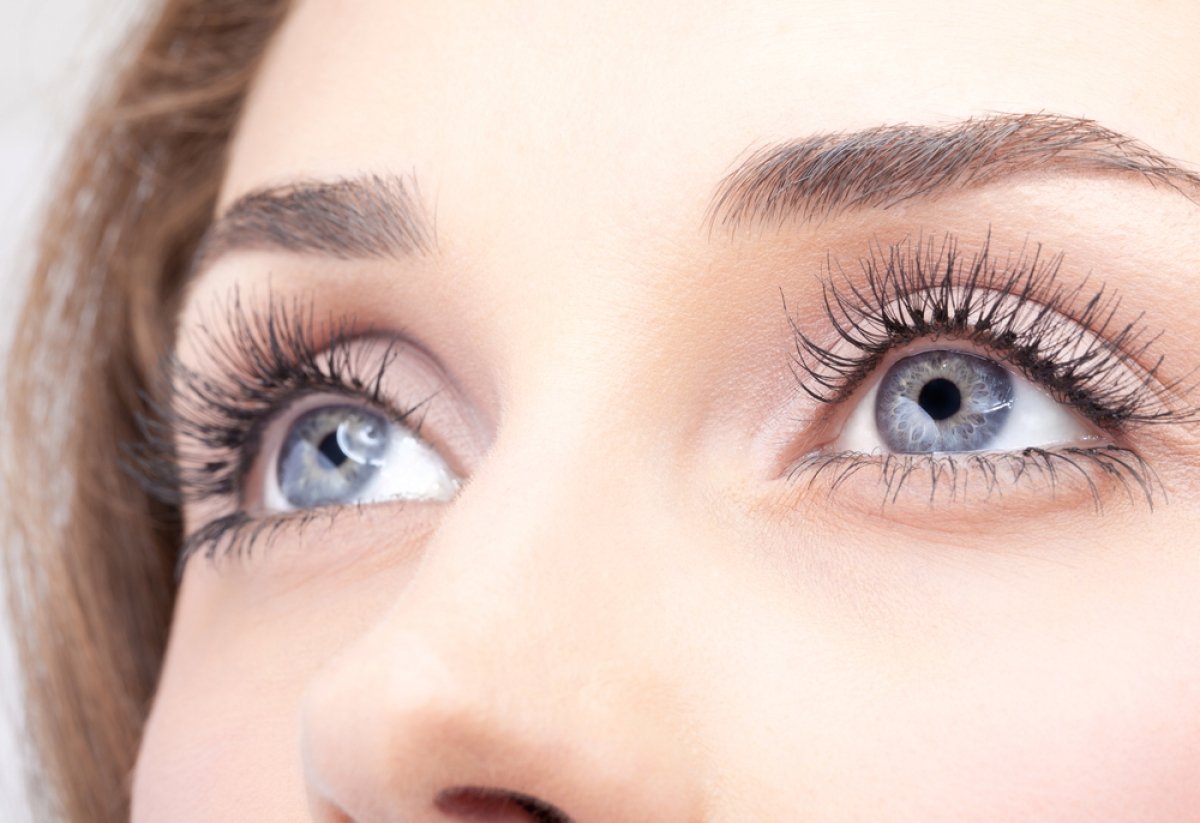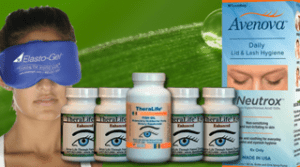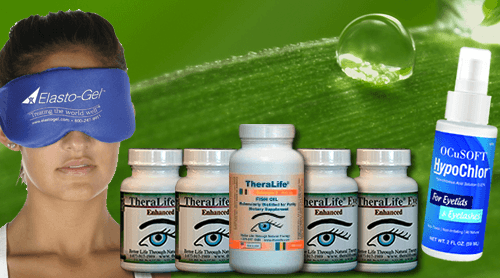Introduction
Ocular rosacea is an inflammatory skin condition that affects the eyes, eyelids, and surrounding areas. It can cause symptoms such as redness of the face and eye area, swollen or flaky eyelids, dryness of the eyes, and stinging sensations.
Conventional treatments for ocular rosacea may include topical creams, antibiotics, and steroids; however, many people are turning to natural remedies in order to reduce their symptoms without the use of medications.
This article will discuss how a natural approach could be used to treat rosacea of the eyes with home remedies. The focus of this article is on using simple lifestyle modifications and natural supplements to help manage rosacea of the eyes symptoms without resorting to prescription drugs.
Research has shown that certain dietary changes can have positive effects on inflammation associated with ocular rosacea. Additionally, there are several herbal remedies which have been found to benefit those suffering from this condition.
The aim of this article is to provide insight into effective natural strategies for managing rosacea of the eyes at home.
The Powerful All Natural Treatment for Ocular Rosacea – Theralife
Understanding Ocular Rosacea
Ocular rosacea is a chronic eye disorder that causes inflammation of the eyes and eyelids. Symptoms may include redness, dryness, burning or stinging sensations in the eyes, as well as itchiness and sensitivity to light. It is estimated that up to half of all people with facial rosacea will also develop ocular symptoms.
In order to diagnose rosacea of the eyes accurately, an allergy test should be done to rule out other conditions such as allergies which can produce similar symptoms. Eye examinations are necessary in order to assess any damage caused by inflammation. Additionally, vision tests should be performed if there have been any significant changes in visual acuity due to ocular rosacea.
Treatment for rosacea of the eyes typically involves avoiding triggers and using medications to reduce inflammation and discomfort such as antibiotics or anti-inflammatory eye drops. Dietary changes may also help alleviate symptoms, so it’s important to discuss dietary modifications with your physician or nutritionist before making any drastic alterations.
With appropriate treatment and lifestyle adjustments, many individuals can manage their condition successfully. Moving forward into the next section about diet modification for rosacea of the eyes provides insight into how proper nutrition can positively impact this common disorder.
Dietary Changes For Ocular Rosacea
Eating habits play a major role in the management of rosacea of the eyes. Making dietary modifications is an important lifestyle change that can help reduce symptoms associated with this condition.
Individuals should focus on consuming foods that are rich in antioxidants, such as berries and leafy greens, which may reduce inflammation and improve overall health. Omega-3 fatty acids found in cold water fish like salmon have also been shown to be beneficial for those who suffer from rosacea of the eyes.
In addition to adding certain types of food into the diet, there are some items that should be avoided or limited if you have ocular rosacea. Spicy foods, caffeine, and alcohol are known triggers of flare ups; therefore it is best to limit their consumption as much as possible. Processed and refined sugars can cause inflammation in the body so they should also be excluded or reduced from your daily intake.
Adopting healthier eating habits along with implementing other lifestyle changes can make a significant difference when managing rosacea of the eyes. In order to further support healing processes many individuals turn to herbal remedies for additional relief from symptoms associated with this condition.
Herbal Remedies For Ocular Rosacea
1. Ocular Rosacea is an inflammatory eye condition that can cause redness, swelling, itching, and discomfort of the eyes.
2. Calendula is an herb that has been traditionally used to treat ocular rosacea symptoms due to its anti-inflammatory, antibacterial, and astringent properties.
3. Chamomile is also an effective herb for treating ocular rosacea due to its anti-inflammatory and anti-allergenic properties, which can help reduce inflammation and irritation of the eyes.
4. Licorice root is another herbal remedy that has been used to treat ocular rosacea. It has anti-inflammatory and antioxidant properties which can help reduce redness, swelling, and itching of the eyes.
5. In addition to Calendula, Chamomile, and Licorice, there are other herbal remedies that can be used to treat ocular rosacea, such as eyebright, goldenseal, and St. John’s wort.
6. Herbal remedies may be used in conjunction with other treatments prescribed by a doctor, such as medications and lifestyle changes, to effectively manage and reduce symptoms of ocular rosacea.
Calendula
Calendula is a popular herbal remedy for ocular rosacea, which can cause redness and irritation of the eyes. Studies have shown that calendula extracts can reduce inflammation and improve symptoms associated with ocular rosacea such as burning sensation or dryness in the eyes.
As an anti-inflammatory agent, calendula helps to reduce swelling caused by environmental triggers like sunlight or wind exposure. Calendula may also help to soothe irritated skin around the eye area. When applied topically, it can promote healing of small cuts and abrasions on the eyelids, thus reducing discomfort from itching or stinging sensations.
Additionally, research suggests that regular use of this herb may help prevent future flare ups due to its antioxidant properties. With these beneficial effects, calendula offers a natural approach to treating ocular rosacea without harsh chemicals or medications.
In conclusion, calendula could be a valuable addition to any regimen designed to manage ocular rosacea symptoms.
Chamomile
Chamomile is another herbal remedy that has been used in traditional medicine to treat ocular rosacea. Chamomile contains compounds such as apigenin and chamazulene, which have anti-inflammatory properties that can help reduce symptoms associated with the condition.
Additionally, chamomile has antioxidant effects and may be helpful for avoiding triggers or providing skin protection when exposed to environmental elements like sunlight or wind.
Studies have shown that topical application of chamomile extract reduced redness and itching around the eye area caused by ocular rosacea. This herb should not be taken orally without consulting a doctor first due to potential interactions with other medicines.
In summary, topical use of chamomile can provide effective relief from symptoms related to ocular rosacea, as well as helping to avoid triggering factors and protecting the delicate skin around the eyes.
Licorice Root
Licorice root is another herbal remedy that has been used in alternative therapies to treat ocular rosacea. This herb contains a compound called glabridin, which is known for its anti-inflammatory and antioxidant properties.
Studies have shown that topical application of licorice extract can help reduce the severity of redness, swelling, and itchiness around the eyes caused by this condition.
Additionally, it may be helpful in avoiding triggering factors through lifestyle modifications such as wearing sunglasses or avoiding direct sunlight exposure.
Licorice root should not be ingested without first consulting with a doctor due to potential interactions with other medications.
In summary, licorice root can provide relief from symptoms associated with ocular rosacea when applied topically while also helping protect against further irritation.
Reducing Stress Levels
The impact of stress on ocular rosacea can be severe. It is important to reduce the levels of stress in order to treat and manage ocular rosacea.
Exercise management and relaxation techniques are two strategies that have been proven effective for reducing stress levels associated with this condition.
Regular exercise helps release endorphins, which are hormones that help improve mood and decrease feelings of depression or anxiety. Additionally, regular physical activity can also help regulate cortisol production – a hormone produced during times of high emotional distress – thus helping to reduce stress levels further. To reap the full benefits, individuals should aim for thirty minutes per day at least three days per week.
Relaxation techniques such as yoga, mindfulness meditation, deep breathing exercises, or progressive muscle relaxation (PMR) may also prove beneficial in relieving symptoms of stress related to ocular rosacea. These activities allow individuals to take time out each day to focus on their own mental health and well-being. They can be done alone in quiet spaces or with the guidance of an instructor depending on preference.
Taking steps towards reducing stress is an essential part of treating ocular rosacea effectively. Eye hygiene practices must then form the next step in managing this condition properly.
Eye Hygiene Practices
The eyes are the windows to our soul and keeping them healthy is vital for maintaining overall health.
Ocular rosacea presents a unique challenge, as typical treatments may not be effective in managing symptoms. Fortunately, there are various home remedies that can help mitigate this condition.
Eye hygiene practices such as ocular massage and lifestyle modifications should form part of any holistic treatment plan.
Ocular massage involves gently rubbing the eyelids with your fingertips using circular motions or pressing rhythmically along the eye socket area. This helps promote circulation around the eyes while also relieving soreness and inflammation associated with ocular rosacea. It is important to remember to use clean hands when performing an ocular massage, as bacteria on dirty hands can cause infection if it comes into contact with mucous membranes in the eyes.
Lifestyle modifications are another essential component of treating ocular rosacea effectively at home. Limiting consumption of spicy foods and alcohol, avoiding environmental triggers such as smoke or pollen, wearing sunglasses outdoors and avoiding long exposure to bright lights can all help reduce discomfort from this condition. Additionally, reducing stress levels through yoga, meditation or other relaxation techniques may also provide some relief from symptoms of ocular rosacea. Keeping hydrated by drinking plenty of water throughout the day is just as important for alleviating irritation caused by this skin disorder.
Keeping The Skin Hydrated
The skin, especially that around the eyes, is prone to drying out and flaking due to ocular rosacea. Keeping it hydrated can help reduce symptoms such as dryness, itching and irritation.
One of the simplest home remedies for this condition is drinking plenty of water throughout the day. Additionally, incorporating hydrating foods into your diet like cucumber, celery, zucchini and squash can keep skin moist from the inside out.
It’s also important to use moisturizing creams or lotions on a daily basis in order to lock-in moisture around the eye area. Look for natural products that are specifically designed for sensitive facial skin with ingredients like aloe vera, jojoba oil, chamomile extract or vitamin E. These will help soothe inflammation and restore needed moisture without further irritating delicate areas around the eyes.
Lastly, look for makeup products labeled as “noncomedogenic” which means they won’t clog pores and cause breakouts. Avoiding heavy foundations and opt instead for lighter formulas made with fewer synthetic chemicals – these are less likely to irritate already inflamed areas of skin caused by ocular rosacea.
With this simple combination of lifestyle changes and gentle skincare solutions you can naturally treat ocular rosacea at home while avoiding potential irritants and allergens.
Avoiding Irritants And Allergens
The importance of hydration for ocular rosacea is paramount, yet there are other steps one can take to help manage this chronic condition. A key component in managing flare ups and avoiding triggers is ensuring that your body avoids irritants and allergens. This may seem like a daunting task, however with the right knowledge and preparation it can become a manageable routine.
When dealing with any type of skin condition, especially rosacea, knowing what substances you should avoid is essential in order to optimize symptom management.
Common environmental irritants such as cigarette smoke, dust mites, or certain food ingredients have been linked to increased inflammation which can lead to worsening symptoms. To prevent these flares from occurring it’s important to identify these potential triggers and limit exposure whenever possible.
Additionally, allergen avoidance measures such as using hypoallergenic products on your skin should be considered if allergies are suspected. It’s also beneficial to carefully examine the labels of beauty products before purchasing them so that you know exactly what ingredients they contain; fragrances and alcohol-based preservatives are two common culprits when it comes to triggering ocular rosacea flares due their high propensity for causing irritation.
Avoiding harsh chemicals while keeping up with regular hygienic practices will go a long way in helping minimize aggravation caused by external factors. With careful consideration of these tips concerning avoidance of irritants and allergens, individuals suffering from ocular rosacea can begin taking proactive steps towards better symptom management and overall health.
Looking ahead to the next step in natural treatment for ocular rosacea: supplements!
Supplements For Ocular Rosacea
Ocular rosacea is a chronic inflammatory condition that affects the eyes and eyelids, characterized by redness, dryness, burning sensation, stinging pain, sensitivity to light and blurred vision.
Treating ocular rosacea with home remedies involves making lifestyle modifications such as avoiding environmental triggers like alcohol and hot beverages and stress-reducing activities.
Additionally, certain supplements can help alleviate symptoms of ocular rosacea:
1. **Antioxidants**: antioxidants can reduce inflammation in the body caused by ocular rosacea. Common dietary sources include dark leafy greens (spinach, kale), colorful fruits and vegetables (blueberries, tomatoes), nuts and seeds (chia seeds, walnuts).
2. **Essential fatty acids**: omega-3 fatty acids are anti-inflammatory foods which work to reduce inflammation associated with ocular rosacea. Sources include oily fish (salmon, mackerel) or plant based sources such as flaxseeds, chia seeds and walnuts.
3. **Vitamins A & C**: Vitamin A encourages skin cell turnover while vitamin C boosts collagen production which helps protect against further damage from UV radiation or other external factors associated with ocular rosacea flare ups. Food sources for both vitamins include citrus fruit (oranges), bell peppers and sweet potatoes.
It is important to note that dietary changes should be made gradually over time in order to achieve optimal results when treating ocular rosacea at home; sudden drastic changes may not have lasting effects on symptom relief long term.
Furthermore it is best practice to consult with a healthcare professional before introducing any new supplement into your health regimen if you have any pre-existing conditions or allergies that could cause adverse reactions when taking them.
Frequently Asked Questions
What Are The Long-Term Effects Of Ocular Rosacea?
Heat sensitivity and sun protection are two of the long-term effects of ocular rosacea.
Those affected by this condition may experience persistent redness, burning, or stinging in the eyes that can be exacerbated by exposure to heat or bright light.
Additionally, people with ocular rosacea should wear sunglasses when outdoors to protect their eyes from ultraviolet radiation as it can further irritate the symptoms.
Prolonged inflammation can also lead to corneal damage and complications which require medical attention.
Is There Any Medical Evidence To Support The Use Of Home Remedies For Ocular Rosacea?
The use of home remedies for ocular rosacea has been widely discussed, with many suggesting that diet and lifestyle changes may be beneficial. However, there is limited medical evidence to suggest the efficacy of these treatments.
While anecdotal reports exist, randomized controlled trials have not been conducted to assess the effectiveness of utilizing dietary modifications or other lifestyle changes in treating ocular rosacea. Further research into this type of therapy is needed to prove its potential efficacy in managing symptoms associated with this condition.
What Are The Potential Side Effects Of Taking Herbal Supplements For Ocular Rosacea?
Herbal supplements have been increasingly used to treat ocular rosacea, but the potential side effects should be carefully considered before taking dietary changes and stress management into one’s own hands.
While some claim that herbal remedies are a safe form of treatment for this condition, there is no denying that supplementing with herbs can cause adverse reactions in some people.
From nausea and headaches to dizziness and hives, these symptoms range from mild to severe depending on the individual’s sensitivity level.
Additionally, there may be interactions between certain medications and herbal supplements which could lead to further complications if not properly monitored by a doctor or healthcare professional.
Therefore it is important to consult with your physician prior to starting any kind of natural therapy such as using herbal supplements for ocular rosacea in order to ensure safety during treatment.
Are There Any Specialized Eye Drops Available To Treat Ocular Rosacea?
When treating ocular rosacea, specialized eye drops may be beneficial for symptom relief. These can include antibiotics such as doxycycline or azithromycin, as well as steroids to reduce inflammation.
In addition to topical medications, dietary modifications and skin care are important components of managing ocular rosacea. Dietary changes should focus on avoiding triggers that could worsen symptoms and supplementing with anti-inflammatory foods.
Additionally, gentle cleansers and moisturizers can help reduce irritation in the delicate area around the eyes while also keeping bacteria at bay.
Are There Any Other Lifestyle Changes That Can Help With Ocular Rosacea?
In pursuit of a healthier lifestyle, dietary changes and stress management can be the key to treating ocular rosacea.
As the old adage goes, ‘you are what you eat’, which makes diet an important factor when it comes to managing flare-ups associated with this condition.
Eliminating foods that may trigger inflammation such as dairy products, processed carbohydrates, and high sugar items is highly recommended for those suffering from ocular rosacea.
Additionally, incorporating foods rich in antioxidants – like berries and leafy greens – into one’s daily routine helps reduce signs of redness or irritation around the eyes.
Stress management should also form part of one’s wellness plan; activities such as yoga or meditation have been known to provide relief by improving focus and providing calming effect on both mind and body.
Conclusion
Ocular rosacea is a chronic condition that can have long-term effects on the eyes if left untreated. Fortunately, there are various natural approaches to treating this issue such as herbal supplements and lifestyle changes.
While these remedies may not be sufficient for severe cases of ocular rosacea, they offer alternatives to those who wish to avoid pharmaceutical medications or eye drops. With careful consideration of potential side effects and an open dialogue with healthcare professionals, individuals suffering from ocular rosacea may find relief through a combination of home remedies and traditional treatments.
In doing so, they can increase their quality of life while reducing the risk of further complications associated with this disorder.





